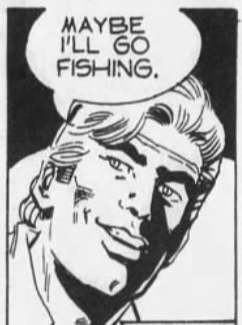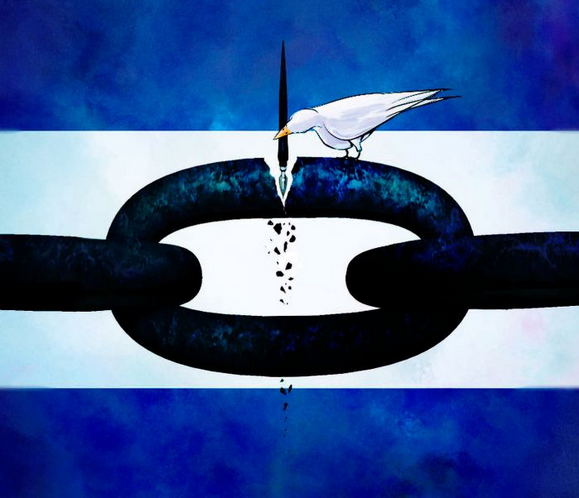CSotD: Independence Day, half a century ago
Skip to commentsThis Doonesbury ran on May 30, 1973, not July 4, but it’s an important intro to the political cartoons that ran a half century ago today, because, like most historical moments, Watergate is shrouded in half-remembered stories and outright myths.
Trudeau may have been a little pessimistic about how much people were paying attention at the time, but only a little, because, just as now, there were a lot of people pursuing their own lives and interests and ignoring the crisis in Washington.
Watergate, however, was boiling over, with daily revelations about tapes and resignations and guilty pleas, though it would be more than a year before Richard Nixon himself resigned.
It seems odd that one of the most dire and insightful comments of the day came from Morrie Brickman’s small society, a feature that ran on a lot of editorial pages of newspapers that didn’t court controversy and whose editorial cartoons on July 4 tended towards celebratory Statues of Liberty and Uncle Sams.
The Chicago Tribune’s cartoonist, Ed Holland, ignored Watergate for a conservative message in keeping with the paper’s well-established rightwing view of things.
As noted in the Omaha World-Herald, the president wasn’t helping to clarify what was going on. (Can’t make out the sig. Anyone? — UPDATE: Ed Fisher. Thanks, Wiley!)
In fact, Jeff MacNelly portrayed him as not only refusing to return service, but as not even willing to take the cover off his racket, despite the number of balls being showered in his direction.
And in Milwaukee, Bill Sanders accused Nixon of remaining defiantly locked away and wrapped in the flag despite the waters rising around him.
And the waters certainly were rising, as Gene Basset pointed out. Congress had taken advantage of the pressures of Watergate and the lessening of loyalties to push through an amendment to a bill financing the State Department that required final withdrawal of troops from Southeast Asia by August 15.
By July 4, American military operations in Vietnam were limited to back-up and advisory roles, though Nixon had managed to pull out one more plum as he struggled to retain power. We’ll get back to that.
Meanwhile, Bill Mauldin depicted Nixon’s current interest as president.
John Fischetti managed to get a real laugh out of the few statements the president did make on the topic. This was a few months before Nixon’s famous “I am not a crook” remark, but Fischetti captured the mood before those words confirmed it.
And Ken Alexander took advantage of the holiday to mock White House Press Secretary Ron Ziegler’s much-derided phrase used for walking back as necessary the few statements the president did make when events proved them to be, well, no longer operative.
Tony Auth also used the July 4 holiday to comment on revelations at the Watergate hearings about FBI/CIA and other surveillance of American citizens.
The White House tapes would not be revealed for two more weeks, but there was substantial testimony about efforts to keep tabs on those who criticized the government, testimony that would later be a launching point for the Church Committee’s investigation of intelligence over-reaching.
Paul Conrad was not amused, and offered this criticism of governmental spying.
Though perhaps Ralph Dunigan’s commentary was most chilling, since it appeared in his light-hearted Dunigan’s People, another feature that ran on a lot of editorial pages that avoided more pointed commentary.
Juxtaposition of them thar Days #1
Oliphant and Stayskal came up with the same gag, riffing on the media’s obsession with Maureen Dean, John Dean’s photogenic wife who sat behind him throughout his Watergate Committee testimony.
The Mo Dean factor was a good example of trying to find light content in otherwise chilling and detailed material. Dean laid out the bones upon which the Watergate scandal had been built. A few fashion notes about a beautiful, immaculately groomed blonde helped break up the otherwise ponderous and disturbing coverage.
Martha Mitchell served a similar purpose in a more long-term sense, her phone calls to reporters providing comic relief rather than serious insight into the illegal events to which she was a witness.
It wasn’t until some time later that she was recognized as, indeed, a Cassandra whose warnings were ignored while her outsized personality was being mocked. The humorous “Mouth of the South,” dismissed as a foolish woman with a drinking problem, was revealed to have been forcibly restrained and injected with tranquilizers in a struggle that left her needing stitches.
John Mitchell served 19 months in prison for his part in the Watergate events.
Juxtaposition of them thar Days #2
Some time we’ll have to do an appreciation of Pat Oliphant, one of the greats of the profession, but even Homer nods, and Oliphant got caught in a second Juxtaposition on July 4, this one over Nixon’s Enemies List.
However, this was a common response, and news coverage of the list treated it as something of a joke, despite the strong suggestion that those on the list could expect surveillance, if not active harassment.
It’s hard to reproduce the massive list in a legible size, but its absurd length is the main reason for all the humor, including both the dismissive headline and Carol Channing’s response, as recorded here.
Yes, Carol Channing was on the list. Hello, Dolly!
There were no cartoonists on the list as released in June, 1973, though it grew later as more names were revealed.
And its huge number of columnists and other media personalities did not include Art Buchwald, who feigned offense at the slight:
The crack at the end about homes in Key Biscayne and San Clemente echoes yet another scandal of the moment, the revelation that Nixon’s corporate supporters had chipped in, along with taxpayers, to upgrade his personal properties into much, much finer places.
Nixon was desperate for something to burnish his badly damaged image, and this July 3 Doonesbury cites a public relations victory he had scored, in getting POWs released in February and March of the year.
It made for a great image at the moment, but it soon proved to be too little, too late, even though we didn’t learn until several years later that Nixon had worked to sabotage LBJ’s peace initiative so he could win the 1968 elections with his own promise of peace.
Perhaps you had to be there.
But, hey: You’re here now.
Don’t screw it up. (Happy 4th!)























Comments 12
Comments are closed.